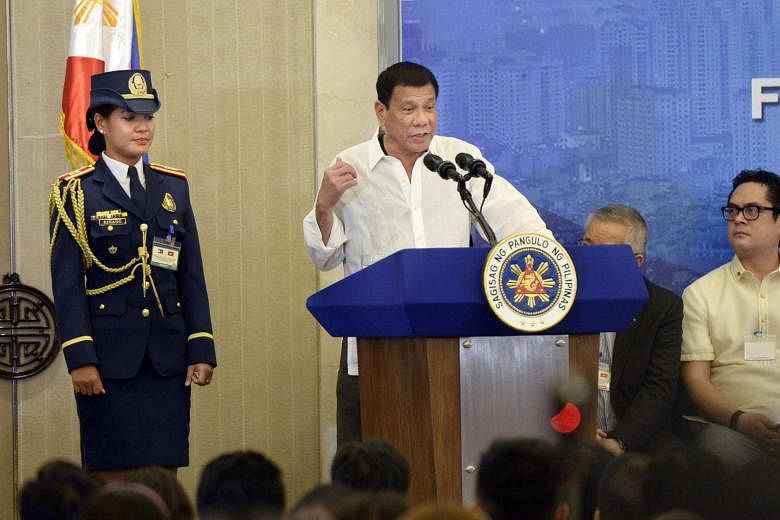HONG KONG/BANGKOK (Bloomberg) - Philippine President Rodrigo Duterte's stance on territorial disputes in the South China Sea will face a fresh international test on Thursday (Sept 29) as he meets leaders in Hanoi a day after the US and Vietnam started naval drills in the waters.
Mr Duterte, who also plans to visit China and Japan next month, will meet President Tran Dai Quang and Prime Minister Nguyen Xuan Phuc during the two-day state visit.
The Philippine leader said he would look to solidify a "strategic partnership" between the nations, which in recent years have shared a common position in opposing China's expansionism in the South China Sea.
"We will seek to identify emerging areas of partnership particularly in the fields of maritime security and law enforcement," Mr Duterte said before his departure on Wednesday.
"As maritime nations with rapidly developing economies, we acknowledge the convergence of our strategic interests."
Mr Duterte has shaken up the status quo in recent weeks in calling for greater cooperation with China while repeatedly attacking the US, the Philippines's main security ally.
Any negotiations with China over disputed territory in the South China Sea would have implications for fellow claimants like Vietnam that contest Beijing's claims to more than 80 per cent of the waters.
United Front
The Philippine Department of Foreign Affairs said Mr Duterte was ready to discuss territorial disputes should the issue be raised during his Vietnam trip, according to local media reports.
However, Foreign Affairs spokesman Charles Jose said that any talks on the issue would focus on the need to maintain peace and stability in the region, the Manila Times reported.
Beijing has reclaimed thousands of acres of land in the waters and increased its military presence in recent years. In addition to being a strategic waterway through which more than US$5 trillion (S$6.8 trillion) in international trade passes each year, the waters are important fishing grounds that are also thought to be rich in oil and gas deposits.
The South-east Asian neighbours had in the past pushed for a united front against China, which prefers that disputes be settled through one-on-one talks.
They scored a major victory in July when an international tribunal ruled that China's claims were unlawful in a case brought by the Philippines - a decision Beijing refused to recognise.
Naval Exercises
Since then, however, Mr Duterte has softened towards China and offered conflicting stances on the ruling. He's indicated he's open to direct talks with China provided there is an economic benefit for the Philippines, a departure from his predecessor Benigno Aquino.
China is the largest trading partner for both the Philippines and Vietnam, while the US is second.
Mr Duterte has also raised concerns in Washington by saying he would put an end to his country's joint sea patrols with the US in the area. That contrasts with American efforts to expand naval engagement with Vietnam and Japan, which indicated this month it would step up activity in the South China Sea by carrying out joint training cruises with the US Navy. China and Russia also held joint naval drills in the area this month.
The US and Vietnam announced on Wednesday the start of its seventh annual naval engagement. The drills beginning in Danang will include maritime exercises focused on communications through the code for unplanned encounters at sea, and a search and rescue operation, according to statement by the office of the US Commander Logistics Group Western Pacific.
The US and Vietnam navies have held joint activities for more than a decade. Vietnam, which is sensitive about appearing to align itself with its former enemy, refers to the engagements as non-combat activities that focus on areas such as in military medicine and navigation.

